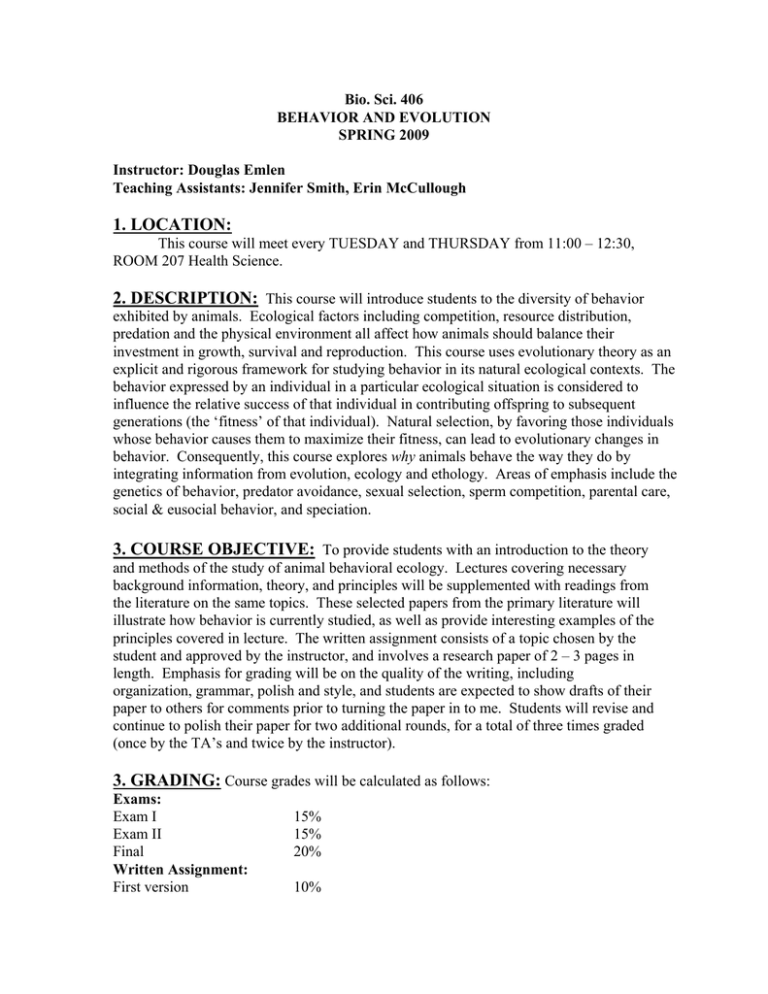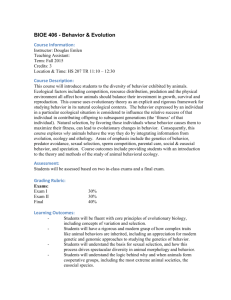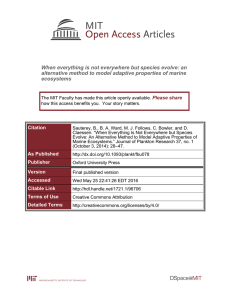Bio. Sci. 406 BEHAVIOR AND EVOLUTION SPRING 2009
advertisement

Bio. Sci. 406 BEHAVIOR AND EVOLUTION SPRING 2009 Instructor: Douglas Emlen Teaching Assistants: Jennifer Smith, Erin McCullough 1. LOCATION: This course will meet every TUESDAY and THURSDAY from 11:00 – 12:30, ROOM 207 Health Science. 2. DESCRIPTION: This course will introduce students to the diversity of behavior exhibited by animals. Ecological factors including competition, resource distribution, predation and the physical environment all affect how animals should balance their investment in growth, survival and reproduction. This course uses evolutionary theory as an explicit and rigorous framework for studying behavior in its natural ecological contexts. The behavior expressed by an individual in a particular ecological situation is considered to influence the relative success of that individual in contributing offspring to subsequent generations (the ‘fitness’ of that individual). Natural selection, by favoring those individuals whose behavior causes them to maximize their fitness, can lead to evolutionary changes in behavior. Consequently, this course explores why animals behave the way they do by integrating information from evolution, ecology and ethology. Areas of emphasis include the genetics of behavior, predator avoidance, sexual selection, sperm competition, parental care, social & eusocial behavior, and speciation. 3. COURSE OBJECTIVE: To provide students with an introduction to the theory and methods of the study of animal behavioral ecology. Lectures covering necessary background information, theory, and principles will be supplemented with readings from the literature on the same topics. These selected papers from the primary literature will illustrate how behavior is currently studied, as well as provide interesting examples of the principles covered in lecture. The written assignment consists of a topic chosen by the student and approved by the instructor, and involves a research paper of 2 – 3 pages in length. Emphasis for grading will be on the quality of the writing, including organization, grammar, polish and style, and students are expected to show drafts of their paper to others for comments prior to turning the paper in to me. Students will revise and continue to polish their paper for two additional rounds, for a total of three times graded (once by the TA’s and twice by the instructor). 3. GRADING: Course grades will be calculated as follows: Exams: Exam I Exam II Final Written Assignment: First version 15% 15% 20% 10% Second version Final version Discussion Section: 10% 10% 20% ****Individuals wishing to re-schedule an exam must arrange this with the Instructor or the TA prior to the day of the exam!!!

